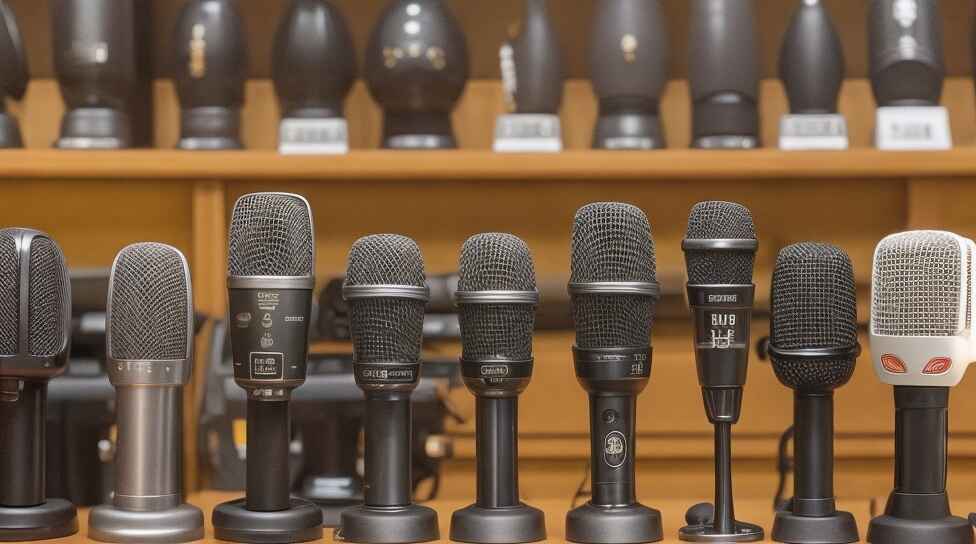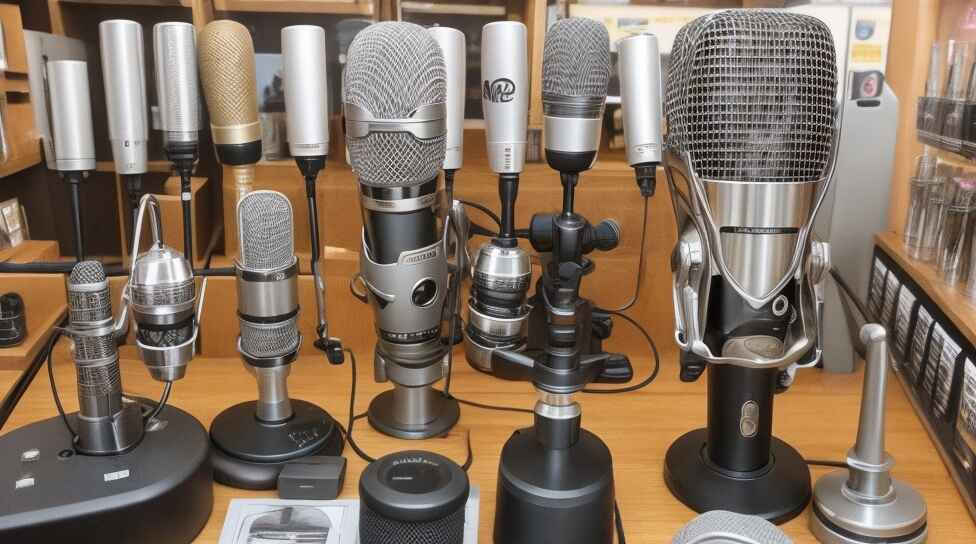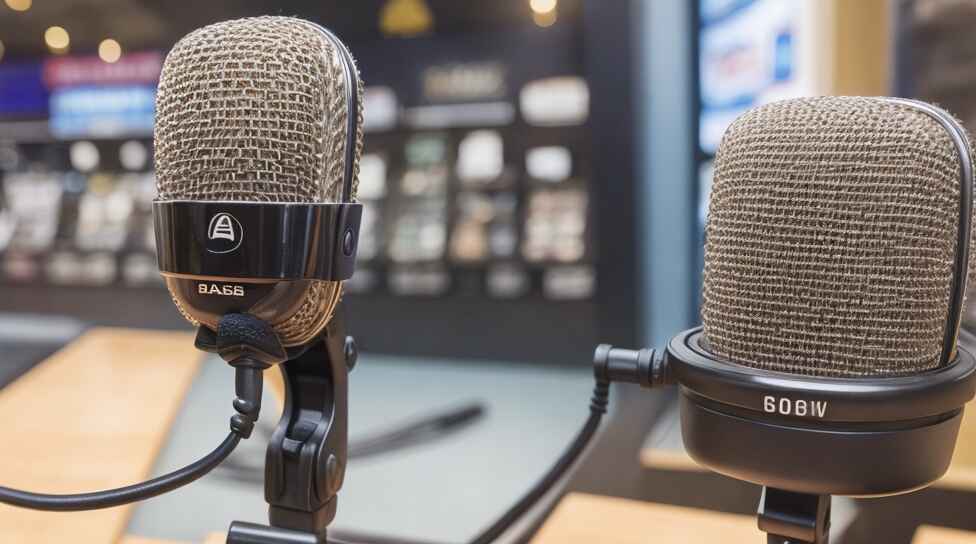Do Pawn Shops Buy Microphones? Well, they won’t start a rock band anytime soon, but they might just strike a deal that hits all the right notes!
In this article, we’ll uncover the secret melody of pawn shops and their surprising love for microphones.
Keep reading to find out why your dusty old mic might be your ticket to a sweet deal!
Do Pawn Shops Buy Microphones

Pawn shops are known for their diverse inventory, which includes everything from jewelry and electronics to musical instruments and audio equipment.
Microphones fall into the latter category, making them a viable item to consider when visiting a pawn shop.
However, it’s essential to remember that not all pawn shops are the same, and their policies on buying microphones may differ.
Pawn shops typically buy items with the intention of reselling them to turn a profit. Therefore, they look for items that have resale value and are in demand.
Microphones can meet these criteria if they meet specific conditions, such as being in good working order and having a brand and model that’s in demand.
What Do Pawn Shops Look for When Buying Microphones?

Pawn shops have a checklist of factors they consider when evaluating microphones. Let’s break down what they look for in detail:
Condition of the Microphone
The condition of the microphone plays a significant role in determining its value.
Pawn shops prefer microphones that are in excellent working condition, free from any defects or damage.
A microphone with scratches, dents, or technical issues may not be as appealing to them.
How does the condition affect the value?
Microphones in pristine condition can fetch a higher price at pawn shops.
Buyers are more likely to be interested in microphones that require little to no repair or maintenance.
On the other hand, if the microphone is damaged or malfunctioning, its value decreases significantly.
What are the common issues to look out for?
When assessing a microphone’s condition, buyers pay close attention to issues like:
- Cosmetic damage: Scratches, dents, or scuffs on the microphone’s body can reduce its value.
- Functional problems: Issues like distorted sound, low sensitivity, or loose connections can be deal-breakers.
- Missing parts: If the microphone is missing essential components like a windscreen or mounting bracket, its value may decrease.
Brand and Model
Not all microphones are created equal, and pawn shops are aware of this fact. Some microphone brands and models are more sought after than others.
Buyers are more likely to purchase microphones from reputable brands known for their quality and reliability.
Do pawn shops prefer certain microphone brands?
Yes, pawn shops tend to prefer well-known brands like Shure, Sennheiser, Audio-Technica, Neumann, and AKG, among others.
These brands have established themselves as industry leaders and are associated with high-quality microphones.
Is the age of the microphone a factor?
The age of the microphone can also influence its desirability.
While vintage microphones from renowned brands can be highly valuable, newer models from these brands are also attractive to buyers.
However, extremely outdated or obsolete models may not garner much interest.
Accessories and Packaging
Accessories can add value to a microphone, making it more appealing to pawn shops.
These accessories can include microphone stands, pop filters, shock mounts, carrying cases, and more.
Additionally, having the original packaging can enhance the perceived value of the microphone.
Do accessories add value to the microphone?
Yes, accessories can increase the overall value of the microphone.
Pawn shops may be more willing to offer a higher price for a microphone that comes with essential accessories, as these items can make the microphone more functional and marketable.
Does having the original packaging matter?
Having the original packaging for a microphone can be a significant advantage.
It provides assurance that the microphone has been well-maintained and protected from damage.
Additionally, it can make the microphone more appealing to potential buyers.
Discover essential information about Lower Mic Quality in my article: How to Lower Mic Quality? Mastering the Art of Audio
How to Prepare Your Microphone for a Pawn Shop Transaction?

If you’ve decided to pawn or sell your microphone, it’s crucial to prepare it properly to maximize its value. Here are the steps you should follow:
Clean and Maintain Your Microphone
Before taking your microphone to a pawn shop, it’s essential to ensure it’s in the best possible condition. Here are some tips for cleaning and maintenance:
- Exterior Cleaning: Wipe down the microphone’s exterior with a clean, damp cloth to remove dust and smudges. Be gentle to avoid damaging the microphone’s finish.
- Windscreen and Pop Filter: If your microphone has a removable windscreen or pop filter, clean it thoroughly to remove any debris or moisture.
- Connections: Check and clean the connections, such as XLR or USB ports, to ensure they are free from dust and debris. A can of compressed air can be useful for this purpose.
- Test the Microphone: Before visiting the pawn shop, test your microphone to ensure it functions correctly. Record your voice or instrument and listen for any unusual noises or distortions.
Gather Relevant Documentation
Having the right documentation can enhance the selling price of your microphone. Here’s what you should bring:
- Original Receipt: If you still have the original purchase receipt, bring it with you. It provides proof of ownership and can give the pawn shop confidence in the microphone’s authenticity.
- Product Manuals: Include any product manuals, warranty information, or documentation that came with the microphone. This shows that you’ve taken good care of the device.
- Service Records: If you’ve had the microphone serviced or repaired by professionals, bring along the service records. This can demonstrate that the microphone has been well-maintained.
- Accessories: Don’t forget to bring any accessories that came with the microphone, such as microphone stands, cables, or carrying cases.
Research the Value of Your Microphone
To set realistic price expectations, you should research the value of your microphone. Here’s how to go about it:
- Online Resources: Look for information on your microphone’s brand and model online. Websites, forums, and marketplaces often have listings for similar microphones, which can give you a ballpark figure.
- Check Marketplaces: Visit online marketplaces like eBay, Amazon, or specialized audio equipment marketplaces to see what similar microphones are selling for. Pay attention to both new and used prices.
- Consult Experts: If you’re unsure about your microphone’s value, consider seeking the advice of audio professionals or experts who can provide insights into its market worth.
- Consider Condition: Keep in mind that the condition of your microphone will significantly impact its value. Be honest about any defects or wear when comparing prices.
By following these steps, you’ll be well-prepared to present your microphone to a pawn shop confidently and negotiate a fair deal.
Finding the Right Pawn Shop for Your Microphone
Choosing the right pawn shop can make a significant difference in your microphone-selling experience. Here’s how to find the ideal pawn shop for your needs:
Research Local Pawn Shops
Start by locating nearby pawn shops that deal with electronics and audio equipment. Here’s how to do it:
- Online Searches: Use search engines and online directories to find pawn shops in your area. Look for keywords like “electronics pawn shop” or “audio equipment pawn shop.”
- Ask Locals: Reach out to friends, family, or colleagues who may have experience with pawn shops. They may recommend reputable establishments.
- Visit in Person: Take the time to visit pawn shops in your vicinity to get a sense of their inventory and professionalism.
Check Pawn Shop Policies
Not all pawn shops have the same policies when it comes to buying electronics, including microphones. Here’s what to look for:
- Acceptance of Electronics: Verify that the pawn shop you choose accepts electronic items like microphones. Some pawn shops specialize in specific categories.
- Requirements for Microphones: Inquire about any specific requirements the pawn shop may have for microphones. They may ask for certain documentation or proof of functionality.
- Negotiation Flexibility: Ask about their willingness to negotiate on price. Some pawn shops are more open to haggling than others.
Read Reviews and Ask for Recommendations
To ensure a reputable and fair transaction, it’s essential to gather feedback and recommendations:
- Online Reviews: Search for online reviews of the pawn shops you’re considering. Pay attention to feedback from customers who have sold electronics to them.
- Ask for Recommendations: Seek recommendations from people you trust, especially if they have had positive experiences with pawn shops in your area.
- Visit Their Website: Many pawn shops have websites or social media profiles where you can learn more about their services and read customer testimonials.
Gain valuable knowledge on Mic Violin Live through my article: How to Mic Violin Live? Techniques for Crystal Clear Sound
The Pawn Shop Transaction Process
Once you’ve prepared your microphone and chosen a pawn shop, it’s time to navigate the transaction process. Here’s what you can expect:
Negotiating a Price
Negotiating the selling price of your microphone is a critical step in the pawn shop transaction process. Here are some tips to help you navigate this stage effectively:
- Research and Knowledge: Come prepared with the research you’ve done on your microphone’s value. Be aware of comparable prices in the market.
- Start with a Realistic Price: Begin negotiations with a reasonable asking price. This sets a positive tone for the discussion.
- Listen and Be Flexible: Pay attention to the pawn shop’s offers and be willing to consider their perspective. Flexibility can lead to a mutually satisfactory agreement.
- Highlight Value-Adding Factors: If your microphone comes with valuable accessories or original packaging, be sure to mention this. It can increase the perceived value.
- Maintain Professionalism: Approach negotiations with respect and professionalism. Avoid becoming overly emotional or attached to a specific price.
What Factors Can Influence the Final Offer?
Several factors can influence the final offer made by the pawn shop:
- Microphone Condition: As discussed earlier, the condition of your microphone is a significant determinant of its value. A well-maintained, fully functional microphone will command a higher price.
- Brand and Model Reputation: Established brands and models from reputable manufacturers may fetch a higher price due to their perceived quality and desirability.
- Market Demand: Current market demand for microphones, especially those of a specific brand or type, can impact the offer. Trends in the audio industry play a role here.
Pawn Shop Documentation and Record-keeping
Understanding the paperwork involved in the transaction is crucial for a smooth process. Here’s what you should know:
- Pawn Ticket or Receipt: The pawn shop will provide you with a pawn ticket or receipt that outlines the terms of the agreement, including the loan amount and interest rate.
- Identification Requirements: You’ll likely need to provide a valid form of identification, such as a driver’s license or passport, as part of the transaction.
- Record-keeping for Your Reference: It’s advisable to keep copies of all documentation related to the transaction. This includes the pawn ticket, any additional agreements, and receipts.
- Loan Terms and Repayment: Familiarize yourself with the terms of the loan, including the interest rate and repayment schedule. This will help you retrieve your microphone if you choose to do so.
Remember, keeping accurate records is not only for your reference but also helps ensure transparency and accountability throughout the process.
Alternatives to Pawn Shops for Selling Microphones
While pawn shops are a viable option, there are alternative avenues to consider when selling your microphone. Here are some alternatives to explore:
Online Marketplaces
Selling microphones on online platforms offers several advantages, including a potentially wider audience and the ability to set your price.
However, it’s essential to be aware of the pros and cons:
Pros:
- Broader Reach: Online platforms like eBay, Amazon, and specialized audio equipment marketplaces have a vast user base, increasing your chances of finding a buyer.
- Control over Pricing: You have the flexibility to set your price based on your research and expectations.
Cons:
- Competition: The online marketplace can be competitive, with many listings for similar items. Standing out may require additional effort.
- Fees and Charges: Some platforms may charge fees for listing and final sales, affecting your overall profit.
Popular online platforms for microphone sales include eBay, Reverb, and Amazon’s Marketplace.
Music Equipment Stores
Specialized music equipment stores may offer advantages over pawn shops, especially if they have a focus on audio equipment. Consider the following:
How Music Equipment Stores Compare to Pawn Shops:
- Expertise: Staff at music equipment stores often have specialized knowledge about microphones and can offer more accurate appraisals.
- Targeted Audience: Buyers at music equipment stores are specifically interested in audio equipment, potentially leading to quicker and more informed transactions.
Advantages of Selling to Specialized Stores:
- Higher Valuation: Given their expertise, specialized stores may be willing to pay a premium for high-quality microphones.
- Network and Contacts: These stores may have connections in the industry, potentially leading to better resale opportunities for your microphone.
Direct Selling to Individuals
Selling directly to individuals can be a rewarding option, but it requires some precautions. Here’s what you should consider:
Tips for Selling Microphones to Individuals:
- Online Platforms: Utilize online marketplaces, classified ads, or specialized forums to connect with potential buyers.
- Clear Communication: Provide detailed information about the microphone, including its condition, brand, and any included accessories.
Safety Precautions when Dealing with Private Buyers:
- Meet in Public Places: When meeting potential buyers in person, choose well-lit and public locations to ensure safety for both parties.
- Cash Transactions: If possible, conduct transactions in cash to avoid any potential issues with electronic payments.
- Trust Your Instincts: If something doesn’t feel right about a potential buyer, trust your instincts and consider other options.
Each of these alternatives offers its own set of advantages and considerations.
By weighing the pros and cons, you can determine which approach aligns best with your preferences and goals for selling your microphone.
FAQs About Do Pawn Shops Buy Microphones
What is the most a pawn shop can give you?
Pawn shops typically offer loans or buy items at a fraction of their retail value.
The maximum amount they’ll provide depends on the item’s value, condition, and the shop’s policies. You can expect around 20-60% of the item’s worth.
Will a pawn shop take headphones?
Yes, pawn shops often accept headphones, especially if they are high-quality and in good condition. Be prepared for them to offer a lower amount than the retail price.
Can I pawn my speakers?
Yes, speakers are generally accepted at pawn shops. The loan or purchase amount will depend on the brand, condition, and demand for the speakers.
What do pawn shops pay for phones?
Pawn shops consider factors such as the phone’s brand, model, condition, and market demand.
You can typically receive a percentage of the phone’s current value, ranging from 20-60%.
What can I pawn to make $500?
To secure a $500 loan or sale at a pawn shop, consider valuable items like electronics, jewelry, musical instruments, or collectibles.
The specific item’s worth and the shop’s policies will determine the amount.
Is it better to pawn or sell?
Deciding between pawning and selling depends on your immediate financial needs. Pawning offers a temporary loan, while selling provides immediate cash. Choose based on your circumstances.
Can I pawn my Beats earbuds?
Yes, pawn shops often accept Beats earbuds. The amount you’ll receive depends on the model, condition, and demand for that specific product.
Can you pawn Dre Beats?
Dre Beats headphones are typically accepted at pawn shops.
The loan or sale amount depends on factors like their model, condition, and market demand.
Where can I sell my Beats headphones?
You can sell your Beats headphones at various places, including pawn shops, online marketplaces like eBay or Craigslist, or through local classified ads.
Consider your preferred method and the value you hope to receive.
Can I pawn a karaoke machine?
Yes, pawn shops often accept karaoke machines. The loan or purchase amount will depend on the brand, model, condition, and demand for karaoke equipment.
Can I pawn a subwoofer?
Subwoofers are commonly accepted at pawn shops.
The loan or sale value will be influenced by factors such as brand, condition, and the specific subwoofer’s market demand.
Final Thoughts About Do Pawn Shops Buy Microphones
In conclusion, pawn shops do buy microphones, but the success of such transactions depends on various factors.
Ensuring your microphone is in excellent condition, researching its value, and being prepared for negotiations are key steps to maximize your return.
However, exploring alternative avenues like online marketplaces, music equipment stores, or direct sales to individuals can also offer opportunities for a successful sale.
The choice ultimately boils down to your specific needs and preferences.
Whether you opt for a pawn shop or an alternative method, a well-informed and strategic approach will help you achieve the best outcome when parting with your microphone.
